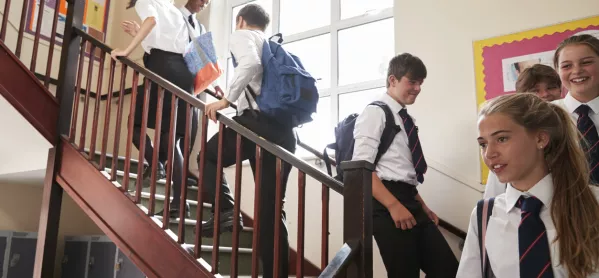The government should not miss a “huge opportunity” to study how coronavirus is transmitted in schools so we do not have to “suppress everything” in future, a professor has said.
Carl Heneghan, professor of evidence-based medicine at the University of Oxford, said that if he was in government, he would be organising studies on how Covid-19 spreads in schools across different regions, and in urban and rural settings.
In some areas where transmission was lower, studies could have staged schools going back and the data could then be used “to reassure us going forward”, he said.
DfE: Secondary school students to be kept 2m apart
Top scientists: 1 June ‘too soon’ to open schools
Sage: Half-class rotas safest way to keep R down
And strategies could be varied and testing targeted in some locations which could be used as “satellite centres to understand transmission”, Professor Heneghan said.
He added: “These [studies] are a huge opportunity right now to understand what works and what doesn’t.
“My one fear is that we miss this opportunity, and we come back in six months’ time and we go ‘we need to understand this data’, and we haven’t got it to say ‘what effect does class size for instance have, does that increase the risk of transmission among children and teachers?’
“Now, I can’t say how important it is we do these studies right now.
“Because if it’s going to reoccur and it reoccurs next winter, and we haven’t learned anything about transmission, we’re going to end up in the same approach where we have to suppress everything, as opposed to learn which bits of the ecosystem in the environment actually do make a difference.”
Professor Heneghan said experts are struggling to say with confidence that transmission is low in schools because of the lack of studies.
It comes as another professor criticised a paper which found “no significant difference” between viral loads of adults and children.
The pre-print, from academics in Berlin and Cambridge, said “children may be as infectious as adults” and consequently cautioned against an unlimited reopening of schools.
Sir David Spiegelhalter, chair of the Winton Centre for Risk and Evidence Communication at the University of Cambridge, said he believes the authors reached a “totally wrong conclusion” and is calling for the paper to be withdrawn.
He added: “Many other statisticians have criticised this paper but essentially their statistical analysis is inappropriate and their conclusions unjustified.”
A spokesperson for Public Health England said: “The opportunity to investigate the transmission of Covid-19 in school settings was limited once home isolation was introduced to reduce spread in the community.
“As schools begin to reopen, enhanced surveillance will be undertaken in any school where cases are detected and protocols to carry out studies to understand transmission are being finalised.”
A Department for Education spokesperson added: “We looked at a range of options in drawing up this phased approach to reopening schools, which is in line with the Government’s overall ‘road map’.
“As in other countries across Europe, the first phases of the wider opening of schools will prioritise younger children. Advice from Sage (Scientific Advisory Group for Emergencies) shows there is a lower overall risk from opening schools and nurseries to younger children, and that they are less likely to become unwell if infected with coronavirus compared to adults.
“This cautious, phased approach for allowing a limited number of pupils back into classrooms has been, and will continue to be, informed by the best possible scientific and medical advice.”




